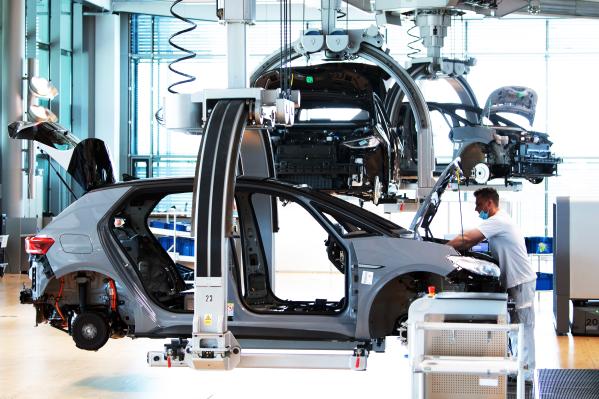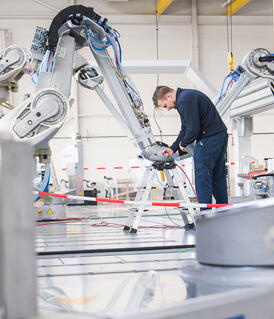Industry in Germany

Alongside Germany’s SMEs SMEs The German economy is characterized first and foremost by small and medium-sized enterprises as well as the self-employed and the independent professions. Some 99.4 percent of all companies are small and medium-sized enterprises. These are firms with annual sales of below EUR 50 million and a… Read more › , the country’s economic strength comes from the strength and innovation of its industrial sector. Above all, Germany’s automotive industry, which employs around 800,000 people, is considered a showpiece of the “Made in Germany” brand. The six leading badges are Volkswagen, BMW, Mercedes-Benz, Opel (Stellantis) and the VW-owned Audi and Porsche. These help to make the German car industry a pioneer in the transition to sustainable mobility.
In order to stay competitive, German businesses are investing billions in research and development (R&D). Electrical propulsion, digital networking and assisted or even autonomous driving are megatrends in automotive transportation. Roughly two-thirds of cars made by German manufacturers are produced in factories abroad.
The chemicals and plant and mechanical engineering sectors have long been particular strengths of the German economy. BASF was founded in 1865 and has its headquarters in Ludwigshafen. With around 112,000 employed at 234 production facilities in over 90 countries around the world, BASF is one of the world’s largest chemical companies. Germany’s leading plant and mechanical engineering business is also a global leader in the key sector of electronics and electrical engineering. Siemens has sites in over 200 countries and is a global player which provides highly innovative solutions from transportation to renewables.
Economic hubs in germany
Germany’s main economic hubs are the large metropolitan regions such as the Ruhr. The Munich and Stuttgart metropolitan areas are known for high tech and automotive manufacturing. The Rhine-Neckar region is a centre of the chemicals and IT industry, while Frankfurt am Main is the financial centre. Nuremberg is a leading centre of industry and the service industries, while Cologne and Hamburg Hamburg In the city and state of Hamburg it is the port that is the power-house of the economy, though with Airbus, Otto Versand and Beiersdorf also located here, this is not immediately apparent. The tanker terminals, mean that almost all the major oil-refining companies are represented in the port. For… Read more › are known for their ports, aviation and media industries. High performance high-tech centres have flourished in former East Germany, particularly the “lighthouse regions” of Dresden, Jena, Leipzig, Leuna and Berlin Berlin Once a year, during the Berlinale film festival, the world of the silver screen focuses its attention on Berlin. And the city’s inhabitants are used to global interest. After all, the people of Berlin have lived in a capital city since 1458. However, there is also a shady side to the city’s history… Read more › - Brandenburg Brandenburg Brandenburg surrounds the capital city of Berlin and benefits from the latter’s “gin and martini belt”. However, with its numerous lakes and forests it also has several trump cards of its own. With the Hohenzollern castles, and in particular Sanssouci Castle, which is included in the UNESCO World… Read more › .Car makers headed the list of the largest German businesses measured by turnover in 2021. Volkswagen was in first place, while Mercedes-Benz Group and BMW Group held places 3 and 4 respectively.
The service industries also have a significant effect on Germany as an industrial location. Some 80% of businesses work in this sector, where they generate almost 70% of Germany’s GDP. They also provide three-quarters of all jobs, employing around 30 million people.
On the way to industry 4.0
Germany is one of the world’s leading industrial nations. German businesses are highly specialised developers of complex goods, especially capital goods and innovative production technologies. The German economy’s ability to innovate is considered the driving force behind the country’s economic strength. Intensive research and development activity is yielding very positive results. The Federal Government Federal Government The Federal Government and cabinet is made up of the Federal Chancellor and the Federal Ministers. While the Chancellor holds the power to issue directives, the ministers have departmental powers, meaning that they independently run their respective ministries in the framework of those directives… Read more › ’s high-tech strategy is also a key source of momentum. This includes the creation of the Federal Agency for Disruptive Innovation (SPRIND) in 2019 and the German Agency for Transfer and Innovation (DATI) in 2021. In 2023, 121 billion euros were allocated to R&D in Germany, equivalent to over 3% of GDP, and well above the OECD average of 2.4%.


